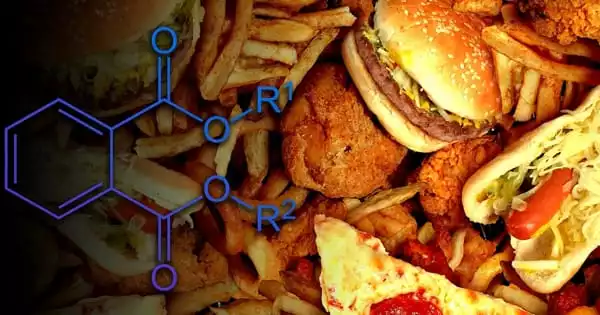If you want to eat healthily, you should avoid fast food because it is high in sodium, sugar, and grease. A new study adds to the case for doing so by discovering that fast food contains phthalates, which have been linked to a variety of potential health risks, such as hormone disruption and lower sperm count.
It’s no secret that fast food is unhealthy. However, new research indicates that many fast-food restaurant items in the United States contain hormone-disrupting chemicals found in plastic. So it’s not only bad for you, but it’s also bad for you on a molecular level.
According to a paper published about the study, the researchers discovered that many fast-food meals contained chemicals known as phthalates. These chemicals are frequently used as plasticizers, which increase the flexibility of plastic materials. They are, however, endocrine-disrupting chemicals (EDC) — substances that can disrupt natural hormone production in animals and humans.
Phthalates can leach into food from food packaging and food processing equipment. Exposure to phthalates can disrupt hormone function and have negative health consequences.
Lariah Edwards
Phthalates can leach into food from food packaging and food processing equipment. Exposure to phthalates can disrupt hormone function and have negative health consequences. Replacement plasticizers are increasingly being used to reduce phthalate exposure, but little is known about their long-term effects on human health.
A recent study found detectable levels of several phthalates and replacement plasticizers in popular fast-food items from major fast-food chains, highlighting the need for these chemicals to be regulated. According to Gizmodo, studies have shown that children exposed to high levels of EDCs frequently develop debilitating health conditions such as asthma and obesity. It can even cause fertility problems later in life.
“We discovered that phthalates and other plasticizers are common in prepared foods available at US fast-food chains, which means that many consumers are getting a side of potentially unhealthy chemicals with their meal,” Lariah Edwards, lead author of the study and postdoctoral scientist at George Washington, told Gizmodo.

According to the paper, the authors of the study collected 64 food samples from six different restaurants as part of their research, including “hamburgers, fries, chicken nuggets, chicken burritos, cheese pizza,” and even food handling gloves.
Phthalates are a common ingredient in PVC food packaging, such as food container linings. These plasticizers are also found in food processing equipment and food preparation materials like gloves. During food processing, preparation, and handling, phthalates can leach into the food. While phthalates are found in a wide range of products, including medical devices, toys, clothing, and personal care items, experts believe that diet is one of the primary sources of exposure.
According to Gizmodo, the team then tested the samples for 11 different chemicals and discovered that 81 percent of the food contained the phthalate di-n-butyl phthalate (DnBP), while 89 percent contained a different non-phthalate plasticiser.
Surprisingly, the study discovered that cheese pizza “had the lowest levels of the majority of chemicals.” So, the next time you’re in the mood for fast food, consider getting a slice instead of a burger or burrito.
The team believes that phthalate contamination was caused by contact with plastic food packaging and gloves. While researchers are still unsure of the full extent of the effects of eating plasticizer-contaminated food, it’s a safe bet that they can cause or exacerbate health or reproductive issues.
“Stronger regulations are required to help keep these dangerous chemicals out of the food supply,” Edwards told Gizmodo.
Human studies on the long-term effects of chronic exposure to these replacement plasticizers have been inconclusive, raising concerns about the safety of these chemicals. The current study found detectable levels of phthalates and the three aforementioned replacement plasticizers in popular food items as well as gloves used in food preparation from major fast-food restaurants in the United States.
Furthermore, the researchers used laboratoryassay data generated by the Environmental Protection Agency (EPA) database to assess the potential toxicity of the replacement plasticizers. Their preliminary analysis revealed that exposure to these replacement plasticizers could have negative health consequences.















